
Previous Awardees
Congratulations 2025 Awardees!
The Busch Biomedical Grant program has announced 10 award recipients for 2025, totaling $599,342 across Rutgers Health, Camden, Newark, and New Brunswick campuses. On behalf of Rutgers University and its President, we want to congratulate our Awardees for their relentless pursuit of academic excellence and their vigorous biomedical research that is shaping the future biomedical community.
2025 Busch Biomedical Grant Awardees
-
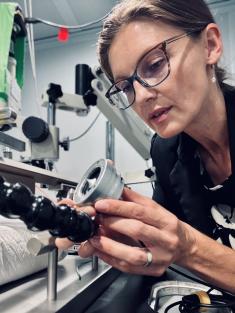
Name: Kasia M. Bieszczad
School: School of Arts and Sciences
Department: Psychology - Behavioral & Systems Neuroscience
Unit: Rutgers-New Brunswick
Primary Appointment Title: Associate Professor
Project Title: A functional synaptic hypothesis for cognitive decline from an early auditory biomarker of AD risk
Project Description: Hearing loss is now recognized as the top modifiable mid-life risk factor for Alzheimer’s Disease (AD) and related dementias, but the biological reasons behind this connection remain unclear. This project explores how early neurophysiological disruptions in the brain’s auditory system—specifically, synaptic mechanisms that help us process and remember meaningful sounds—might be among the first signs of Alzheimer’s-related brain changes. Using a transgenic rat model with human-like Alzheimer's risk genes, the research will develop cutting-edge techniques to detect early synaptic failures that could serve as prodromal biomarkers for the disease. Our team proposes that the auditory brain doesn’t just reflect hearing ability—it may reveal critical breakdowns in synaptic mechanisms of memory and attention systems that signal dementia long before traditional symptoms appear. By unlocking this link, this and the studies that follow could revolutionize how we diagnose and intervene in Alzheimer’s Disease decades earlier than is currently possible.
-
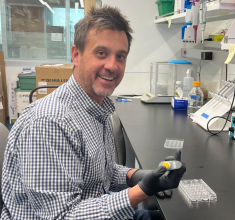
Name: Brian Corbett
School: Faculty of Arts & Sciences
Department: Biology
Unit: Rutgers-Camden
Primary Appointment Title: Assistant Professor
Project Title: Investigating the mechanisms by which sphingosine-1-phosphate receptor 3 reduces social anxiety-like behavior
Project Description: Impaired sociability is a debilitating, yet poorly understood, aspect of stress-related psychiatric disorders like anxiety and depression. We previously identified sphingosine-1-phosphate receptor 3 (S1PR3) as being increased in the brains of rodents that naturally display high sociability following stress. More recently, we found that pharmacologically activating S1PR3 increases sociability and activates brain regions important for social behavior. The goal of this project is to more precisely understand the intracellular signaling mechanisms and neural circuits regulated by S1PR3 that lead to increased sociability.
-
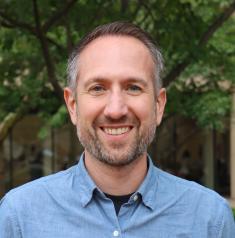
Name: Dominic Del Re
School: New Jersey Medical School, Rutgers Health
Department: Cell Biology and Molecular Medicine
Unit: Rutgers Health
Primary Appointment Title: Assistant Professor
Project Title: Targeting neutrophil function to limit cardiac injury
Project Description: Heart disease resulting from myocardial ischemia is a leading cause of mortality worldwide. Excessive inflammation is thought to contribute to cardiac injury caused by ischemia and worsen heart failure, yet the underlying mechanisms responsible remain unclear. This proposal will characterize the neutrophil transcriptome during cardiac inflammation and investigate the molecular mechanisms that dictate their polarization and function in response to an ischemic event. These findings will be leveraged to develop novel therapeutic approaches for modulating cardiac inflammation, injury and wound healing.
-
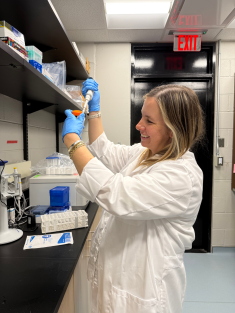
Name: Bridget Matikainen-Ankney
School: School of Arts and Sciences
Department: Psychology Department
Unit: Rutgers-New Brunswick
Primary Appointment Title: Assistant Professor
Project Title: Dissecting the role of nucleus accumbens circuits in feeding and obesity.
Project Description: The goal of this project is to understand the role of a brain circuit involved in motivated behaviors in persistent obesity-linked phenotypes. Specifically, we hypothesize that diet-induced obesity drives enhancements in the prelimbic cortex-to-nucleus accumbens circuit, and that such enhanced activity underlies increases in food seeking. Further, we will test the mechanistic role of the mu opioid receptor in driving such changes.
-

Name: Jim Millonig
School: Center for Advanced Biotechnology and Medicine (CABM)
Department: Neuroscience and Cell Biology
Unit: Rutgers Health
Primary Appointment Title: Associate Professor
Project Title: Investigating a p53 mediated mechanism for autism-related cancer.
Project Description: Autism is a neurodevelopmental disorder with numerous co-morbidities, including pediatric cancers. The Millonig laboratory studies autism using iPSC-derived neurons and has identified a shared hyperproliferation phenotype across autism subtypes, including the 16p11.2 chromosomal deletion (16pDel). They have demonstrated that 16pDel hyperproliferation is due to the decreased the expression of tumor suppressor gene TP53 (p53). In this funded study, Dr Millonig is collaborating with Dr Wenwei Hu, a renowned p53 expert, to investigate if decreased p53 levels results in a diminished stress response, increased DNA damage and tumor formation. These well-defined experiments align with the teams’ expertise and will serve as the basis for future federal grants. This study will begin to address the mechanism linking pediatric cancer and autism, an understudied but clinically essential question.
-

Name: Pingyue Pan
School: Robert Wood Johnson Medical School
Department: Neuroscience and Cell Biology
Unit: Rutgers Health
Primary Appointment Title: Assistant Professor
Project Title: Convergent genetic mechanisms in Parkinson’s disease
Project Description: Parkinson’s disease (PD) is a progressive brain disorder marked by the loss of dopamine-producing neurons in the substantia nigra, leading to movement difficulties. While the causes of PD are multifactorial, genetic mutations provide crucial insight into pathogenic mechanisms. In this project, we will explore the genetic interaction of two PD genes, SYNJ1 and VPS35, in regulating synaptic and motor function at cellular and behavioral levels. As Changes in synaptic dopamine release are often found in the early disease process, our study will lay the groundwork for identifying convergent pathogenic signaling and therapeutic targets for early PD.
-
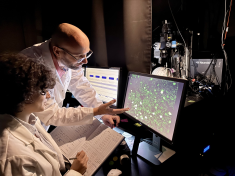
Name: Pierre-Olivier Polack
School: School of Art and Science - Newark
Department: Center for Molecular and Behavioral Neuroscience
Unit: Rutgers-Newark
Primary Appointment Title: Associate Professor
Project Title: Selective Optogenetic Control of Feature-Encoding Neurons in Mouse Visual Cortex
Project Description: Our brains make sense of the world by interpreting distinct patterns of neuronal activity generated by sensory inputs, such as the shape or movement of an object. A central challenge in neuroscience is understanding how these patterns give rise to perception, but researchers currently lack tools to directly manipulate sensory representations in the brain. This project will develop a new method to “tag” and control neurons in the mouse visual cortex that respond to specific visual features, allowing us to test how these groups of neurons contribute to visual perception. By combining tagging with tools to turn neurons on or off while mice perform perceptual tasks, we will be able to directly study how brain circuits create sensory experiences. This work will provide new insights into how the brain processes sensory information.
-

Name: Yevgeniy (Jay) Serebrenik
School: Robert Wood Johnson Medical School
Department: Biochemistry and Molecular Biology
Unit: Rutgers Health
Primary Appointment Title: Assistant Professor
Project Title: Mapping Huntingtin Inclusion Clearance Machinery by Pooled Induced Proximity
Project Description: This project will uncover how cells regulate protein aggregation, a process central to both normal biology and neurodegenerative disorders such as Huntington’s disease. Although cells can influence the aggregation of many different proteins, our understanding of this landscape remains limited. Leveraging SPOTLITES, our innovative platform for pooled induced-proximity screening, we will map the proteins that remodel or dismantle harmful huntingtin aggregates. These insights will reveal critical pathways that maintain protein quality control and cellular resilience. Ultimately, this work will provide a foundation for next-generation proximity-based therapies designed to restore healthy protein function in Huntington’s and other devastating neurological diseases.
-
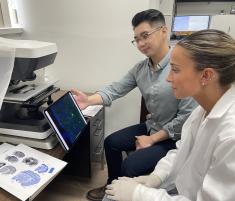
Name: Justin Yao
School: Robert Wood Johnson Medical School
Department: Head and Neck Surgery & Communication Sciences
Unit: Rutgers Health
Primary Appointment Title: Assistant Professor
Project Title: Neural Circuit Mechanisms Linking Hearing Loss to Multisensory Cognitive Deficits
Project Description: This project investigates how noise-induced hearing loss (NIHL), a leading cause of sensory impairment worldwide, disrupts the brain’s cognitive ability to combine auditory and visual information during decision-making. Using a gerbil model, this study will examine how NIHL alters neural activity in the parietal cortex, a region critical for integrating sensory signals and guiding perception. By combining multisensory behavioral tasks with circuit-level recording methods, this research will reveal how hearing loss impairs communication between auditory, visual, and parietal brain regions. The findings will advance our understanding of how sensory deficits contribute to cognitive challenges and help inform strategies to improve speech comprehension and quality of life for individuals with hearing loss.
-
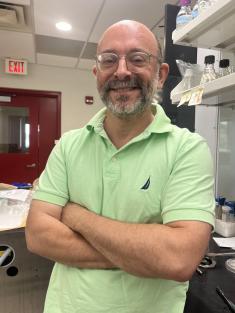
Name: Mikel Zaratiegui
School: School of Arts and Sciences/Division of Life Sciences
Department: Molecular Biology and Biochemistry
Unit: Rutgers-New Brunswick
Primary Appointment Title: Associate Professor
Project Title: Novel mechanisms for survival of mitochondrial DNA loss
Project Description: While mitochondria are best known as the cell’s power plants, they also serve as essential “factories” producing metabolites and cofactors that no other organelle can make. To perform these functions, they must import nuclear-encoded proteins from the cytoplasm, a process driven by the same membrane potential that fuels ATP synthesis. This membrane potential is normally generated by Electron Transport Chain components encoded in the mitochondrial genome. When mitochondrial DNA is lost or damaged, the membrane potential collapses and protein import is impaired. We have found, however, that partial loss of proteasome function, the cell’s main protein degradation machinery, can promote mitochondrial protein import independently of membrane potential. We aim to define the mechanism of this alternative pathway and investigate the nuclear adaptations that support survival without mitochondrial DNA. Since aging cells show decreased membrane potential, our research could point to novel strategies to improve mitochondrial function during aging.
